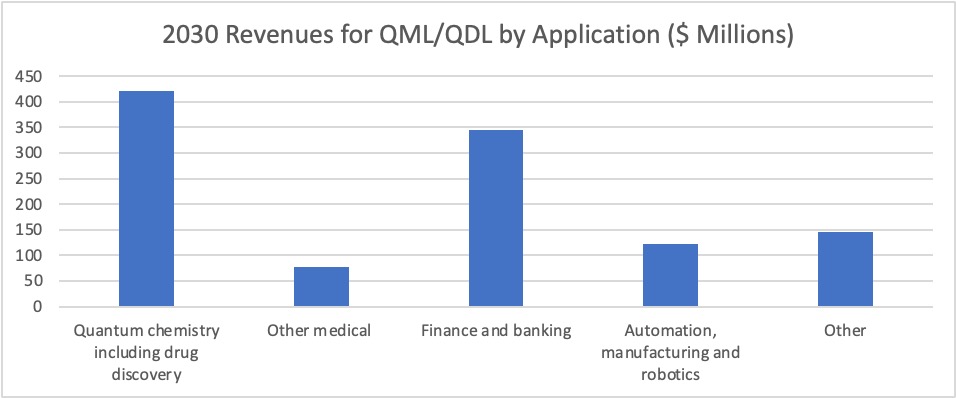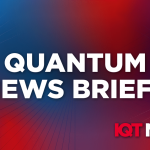IQT Research Report Estimates Revenues from Quantum Machine Learning and Quantum Deep Learning at $1.1 Billion in 2030

IQT Research identifies opportunities in quantum machine learning (QML) and quantum deep learning (QDL). It claims that while revenues from QML/QDL will be just $26.7 million in 2025, they will rise to $1.1 billion in 2030 and $7.0 billion in 2034. QDL is defined as QML with neural networks.
For a sample of this report, click on Request Excerpt.
For a quote, click on Request a Quote.
About the Report:
The primary goal of this report is to show how new business revenues will be generated using quantum computing. Specifically, this report analyzes how:
- Using quantum computers can better solve traditional ML problems.
- Algorithms better suited to QML can be developed.
- New ways of delivering QML can emerge especially over a cloud.
- Using classical ML can optimize quantum hardware.
This IQT Research report contains the most comprehensive analysis of the QML/QDL space currently available. New products, R&D and trials are all covered along with profiles of the QDL/QML activities of numerous companies. Some of these companies – both QML/QDL vendors and end users — include 1QBIT, Airbus. Amazon/AWS, Atom Computing, BMW, Dassault, Deloitte, D-Wave, Fidelity, Google, HSBC, Hyundai, IBM, IonQ, Microsoft, Moody’s Analytics, NVIDIA, ORCA Computing, Pasqal, Planqc, QC Ware, Quantinuum, QuantrolOx, Pasqal, QuEra, Rigetti, Terra Quantum, Unilever, Volkswagen, Xanadu and others.
In the report, ten-year forecasts of QML/DL revenues are included with breakouts by application and technology. The report also analyzes the factors retarding the growth of QML such as the cost and immaturity of QML, the need for QML-optimized algorithms and a deeper understanding of how QML is best deployed. IQT Research believes that the forecasts in the report are plausible and note that many AI forecasts today seem highly exaggerated.
From the Report:
- Likely commercial applications for QML are already beginning to appear and will burgeon in the next few years. In the investment world, conventional ML is used for portfolio optimization, but QML can already find itself in demand for the most complex portfolios. QML might also be useful to analyze large data sets and identify where potential threats are coming from. QML would be especially useful where the consequence of a mistake is catastrophic – medicine and financial services are obvious examples here.
- IQT Research see potential for QML where the data sets on which QML are trained include sophisticated sensor data. The proliferation of sensors (including wearable sensors) over the past few years increases the size of standard healthcare and robotics data sets for ML/QML. We note that ML researchers are developing solutions that detect cancerous tumors and diagnose eye diseases. We can also see an important role for QML in future robotics products.
- ML can help make better quantum computers. For example, ML can model the error patterns in qubits. In this way ML may help take quantum computing beyond today’s NISQ realities. Other ways in which ML may be able to assist in the creation of new quantum computers is in the design of new materials for quantum computing and in running tests comparing the results to benchmarking metrics or formal standards.
- Security issues in QML can threaten both training and inference phases and must be guarded against. Vulnerabilities that can be found in the QML model include the model architecture, training/testing data, encoding techniques, and trained parameters. Free riders can benefit from not having to pay for expensive quantum compute time and for the millions of “trials” in a training run. The free rider aspect of security in QML also extends to time. Thieves can end route around the significant amount of time — potentially months to years — that it takes to construct a QML model due the need to execute hundreds of thousands of quantum circuits.
About IQT Research:
IQT Research is a division of 3DR Holdings, and the first industry analyst firm dedicated to
meeting the strategic information and analysis needs of the emerging quantum technology
sector. In addition to publishing reports on critical business opportunities in the quantum
technology sector, Inside Quantum Technology produces a daily news website on business-related happenings in the quantum technology field.
3DR HOLDINGS also organizes international events. The next conference IQT Nordics will be devoted to Real-World Applications and Progress Enabled by Quantum Technology and will be held May 20-22, 2025, in Sweden.
Complete information can be found at www.iqtevent.com.
For inquiries, please contact:
Missy Wade
missy@insidequantumtechnology.com
Telephone: 888-384-7144


















